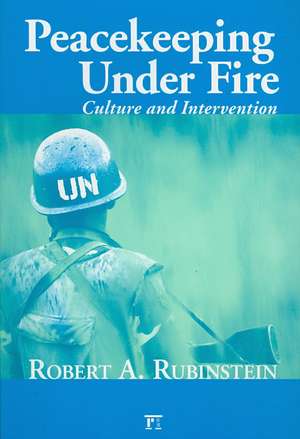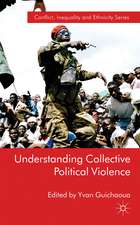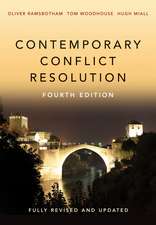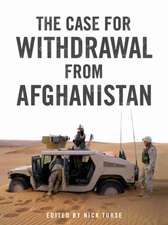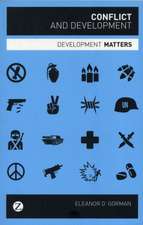Peacekeeping Under Fire: Culture and Intervention
Autor Robert A. Rubinsteinen Limba Engleză Paperback – 30 noi 2008
| Toate formatele și edițiile | Preț | Express |
|---|---|---|
| Paperback (1) | 256.76 lei 6-8 săpt. | |
| Taylor & Francis – 30 noi 2008 | 256.76 lei 6-8 săpt. | |
| Hardback (1) | 1180.92 lei 6-8 săpt. | |
| Taylor & Francis – 30 iun 2008 | 1180.92 lei 6-8 săpt. |
Preț: 256.76 lei
Preț vechi: 287.12 lei
-11% Nou
Puncte Express: 385
Preț estimativ în valută:
49.13€ • 51.53$ • 40.90£
49.13€ • 51.53$ • 40.90£
Carte tipărită la comandă
Livrare economică 01-15 aprilie
Preluare comenzi: 021 569.72.76
Specificații
ISBN-13: 9781594515484
ISBN-10: 1594515484
Pagini: 224
Dimensiuni: 152 x 229 x 14 mm
Greutate: 0.29 kg
Ediția:1
Editura: Taylor & Francis
Colecția Routledge
Locul publicării:Oxford, United Kingdom
ISBN-10: 1594515484
Pagini: 224
Dimensiuni: 152 x 229 x 14 mm
Greutate: 0.29 kg
Ediția:1
Editura: Taylor & Francis
Colecția Routledge
Locul publicării:Oxford, United Kingdom
Recenzii
“In this readable and original book, Robert Rubinstein treats UN peacekeeping as a transnational social, as well as military, institution in which a wide variety of participants develop a shared identity and a common sense of purpose. Writing during the period before and after the end of the Cold War, he sees the expansion of both the challenges to, and the original concept of, peacekeeping, not as a radical break with previous practice but as a logical development of “classic” peacekeeping, the study of which is highly relevant to the understanding and improvement of contemporary operations. The result is a rich and original history of peacekeeping itself, with a new emphasis on the all-important, and hitherto much neglected, cultural aspects of international intervention. This book is an important contribution to the development of one of the UN’s most vital functions.”
—Brian Urquhart, Former Undersecretary-General of the United Nations
“Peacekeeping under Fire is a fascinating and thought-provoking investigation into how culture is critical to peacekeeping. Ethnographically rich and theoretically sophisticated, it is essential reading for anyone interested in peace and international security.”
—Carolyn Nordstrom, University of Notre Dame
“A significant contribution to understanding international peacekeeping, as well as an important demonstration of how the perspective of cultural anthropology can enrich our understanding of modern military operations.”
—David R. Segal, University of Maryland
“An engaging book that analyses the complex world of the peacekeeper and the ways in which culture plays a vital part in both a contextual and a personal sense.”
—Dr. Deborah Goodwin, Royal Military Academy, Sandhurst, UK
“Peacekeeping under Fire gives the first extensive account of how culture directly impacts peacekeeping operations and sets the stage for a new field in 21st century peacekeeping interventions.”
—Tanja Hohe Chopra, The World Bank, Kenya
“In this absorbing new book by a leading anthropologist of peace and conflict, Robert Rubinstein places power and culture at the center of its analysis and recommendations.”
—Matthew Gutmann, Brown University
—Brian Urquhart, Former Undersecretary-General of the United Nations
“Peacekeeping under Fire is a fascinating and thought-provoking investigation into how culture is critical to peacekeeping. Ethnographically rich and theoretically sophisticated, it is essential reading for anyone interested in peace and international security.”
—Carolyn Nordstrom, University of Notre Dame
“A significant contribution to understanding international peacekeeping, as well as an important demonstration of how the perspective of cultural anthropology can enrich our understanding of modern military operations.”
—David R. Segal, University of Maryland
“An engaging book that analyses the complex world of the peacekeeper and the ways in which culture plays a vital part in both a contextual and a personal sense.”
—Dr. Deborah Goodwin, Royal Military Academy, Sandhurst, UK
“Peacekeeping under Fire gives the first extensive account of how culture directly impacts peacekeeping operations and sets the stage for a new field in 21st century peacekeeping interventions.”
—Tanja Hohe Chopra, The World Bank, Kenya
“In this absorbing new book by a leading anthropologist of peace and conflict, Robert Rubinstein places power and culture at the center of its analysis and recommendations.”
—Matthew Gutmann, Brown University
Notă biografică
Robert A. Rubinstein is Professor of anthropology and international Relations at the Maxwell School of Syracuse University. He is the author of many books including most recently Doing Fieldwork: The Correspondence of Robert Redfield and Sol Tax (2001) and (with Mary Lecron Foster) The Social Dynamics of Peace and Conflict: Culture in International Security (1997).
Cuprins
1 Introduction 2 A Brief and Selective History of Peacekeeping 3 Culture and Peacekeeping: A Conceptual Framework 4 Turn Left at the Mosque: Anthropological Fieldwork and Peacekeeping 5 Symbolic Construction of Community and Cooperation 6 You Will Have to Kill Me to Get By: Individual Action and Peacekeeping 7 Organizational Cultures and Peacekeeping 8 Peacekeeping Under Fire 9 Intervention as Cultural Practice
Descriere
Offers an understanding of the roles that culture plays in peacekeeping's success or failure. This work shows that cultural considerations are key elements at all levels of peacekeeping operations. It demonstrates how questions of power, identity, and political perception emerge from the cultural context of peacekeeping.
